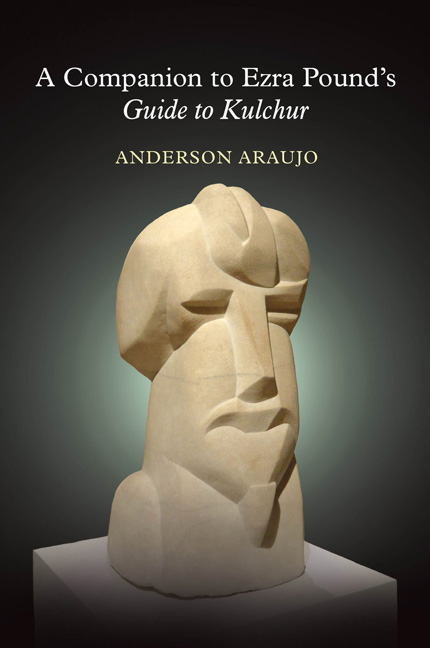Book contents
- Frontmatter
- Contents
- Acknowledgments
- Abbreviations
- Introduction
- Guide to Kulchur
- Part I
- Section I
- Section II
- Part II
- Section III
- Section IV
- Part III
- Section V
- 15 Values
- 16 Europe Or The Setting
- 17 Sophists
- 18 Kulchur: Part One
- 19 Kulchur: Part Two
- 20 March 12th
- 21 Textbooks
- Section VI
- Part IV
- Section VII
- Section VIII
- Section IV
- Part V
- Section X
- Section XI
- Part VI
- Section XII
- Section XIII
- Addenda: 1952
- Notes
- Index
16 - Europe Or The Setting
from Section V
- Frontmatter
- Contents
- Acknowledgments
- Abbreviations
- Introduction
- Guide to Kulchur
- Part I
- Section I
- Section II
- Part II
- Section III
- Section IV
- Part III
- Section V
- 15 Values
- 16 Europe Or The Setting
- 17 Sophists
- 18 Kulchur: Part One
- 19 Kulchur: Part Two
- 20 March 12th
- 21 Textbooks
- Section VI
- Part IV
- Section VII
- Section VIII
- Section IV
- Part V
- Section X
- Section XI
- Part VI
- Section XII
- Section XIII
- Addenda: 1952
- Notes
- Index
Summary
The De Vulgari Eloquio is still the best guide to the troubadours: As Pound suggests, Dante's linguistic treatise De Vulgari Eloquentia (c.1303–5) mainly concerns the three vernaculars of Southern Europe: oc, oil, and si. Dante associates oil with prose, si with the poetic vernacular of Italy, and oc with the poetry of the troubadours. Although second in importance for Dante (si takes pride of place as the most suitable language for contemporary Italian poetry), oc is nonetheless the language of troubadour poets, which would also be critically important for Pound. As Dante writes in Book II, “we find that illustrious individuals have written poetry in the vernacular: Bertran de Born on arms, Arnaut Daniel on love, Giraut de Borneil on integrity; Cino da Pistoia on love.” Dante goes on to cite a number of other canzoni. In his essay written in Italian and published in Rome in 1942 (translated into English in 1952 as A Visiting Card), Pound writes, “Dante was my Baedeker in Provence.”
Petrarch: Francesco Petrarca (1304–74), Italian poet and humanist, author of the collection of Italian lyrics Canzoniere (Rerum Vulgarium Fragmenta), containing a long series of sonnets devoted to the poet's unrequited love for Laura. Petrarch ranked himself second only to Dante in the pantheon of literary history. However, as Pound hints at here, and as Petrarch's allegorical poem Triumphi demonstrates, Petrarch also aimed to create a subjective and psychological alternative to the eschatological and metaphysical vision of Dante's Divina Commedia.
Chaytor: In The Troubadours of Dante (1902), Henry J. Chaytor (1871–1954) pays tribute to the “deep study of Provençal poetry” that constitutes Dante's De Vulgari Eloquentia. As Pound suggests, Chaytor also acknowledges his indebtedness to the treatise “for what we know of the theory of stanza form in the troubadour lyrics,” stressing the necessity of studying troubadour stanza forms to understand the development of Dante's own forms of lyric poetry: the canzone, the ballata, the sestina, and the sonnet.
- Type
- Chapter
- Information
- A Companion to Ezra Pound's Guide to KulcherGuide to Kulcher, pp. 146 - 156Publisher: Liverpool University PressPrint publication year: 2018

